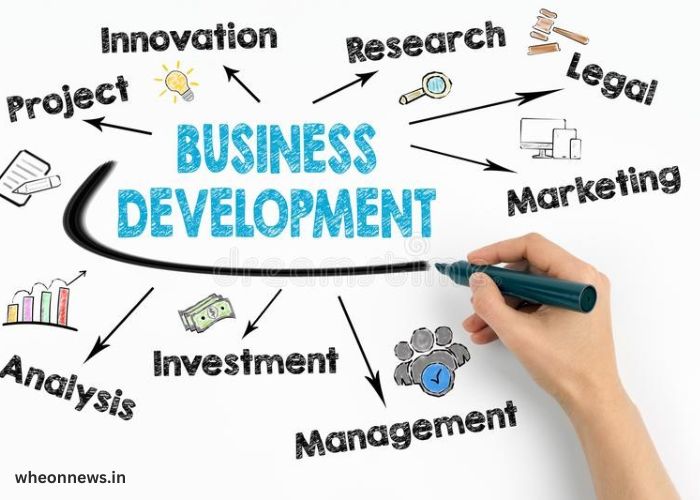
A Business Development Executive (BDE) plays a pivotal role in driving a company’s growth and success. They are responsible for identifying new business opportunities building relationships with potential clients, and expanding the company’s market presence. This role requires a combination of strategic thinking, excellent communication skills, and a deep understanding of the market dynamics.
Key Points:
- Identifying New Business Opportunities: BDEs research and analyze market trends to find potential areas for business expansion.
- Building and Maintaining Client Relationships: They establish strong relationships with clients to foster trust and loyalty.
- Driving Revenue Growth: By securing new clients and partnerships, BDEs contribute directly to the company’s revenue.
What Are the Primary Responsibilities of a Business Development Executive?
A Business Development Executive is tasked with several key responsibilities:
- Market Research and Analysis: Conducting thorough research to identify market trends, customer needs, and potential areas for business expansion.
- Lead Generation: Identifying and pursuing new business opportunities through various channels, including networking, cold calling, and attending industry events.
- Client Relationship Management: Building and maintaining strong relationships with clients to ensure satisfaction and repeat business.
- Sales Strategy Development: Creating and implementing effective sales strategies to achieve business objectives.
- Negotiation and Closing Deals: Engaging in negotiations with clients and partners to secure contracts and close deals.
- Collaboration with Internal Teams: Working closely with marketing, product development, and other departments to align business development efforts with company goals.
What Skills Are Essential for a Business Development Executive?
To excel in this role, a Business Development Executive should possess the following skills:
- Communication Skills: The ability to convey ideas clearly and persuasively to clients and team members.
- Negotiation Skills: Proficiency in negotiating terms and closing deals that benefit both the company and the client.
- Strategic Thinking: The capability to develop long-term strategies that align with the company’s objectives.
- Market Knowledge: A deep understanding of the industry, market trends, and competitor activities.
- Problem-Solving Skills: The ability to identify challenges and develop effective solutions.
- Adaptability: Being flexible and open to change in a dynamic business environment.
- Time Management: Efficiently managing time and prioritizing tasks to meet deadlines.
- Leadership: Guiding and motivating teams to achieve business development goals.
How Does a Business Development Executive Contribute to Company Growth?
A Business Development Executive contributes to company growth in several ways:
- Expanding Market Reach: By identifying new markets and customer segments, BDEs help the company reach a broader audience.
- Increasing Revenue Streams: Securing new clients and partnerships leads to additional revenue sources.
- Enhancing Brand Reputation: Building strong client relationships and delivering value enhances the company’s reputation in the market.
- Driving Innovation: Feedback from clients and market insights can lead to new product or service offerings.
- Improving Competitive Position: By staying informed about market trends and competitor activities, BDEs help the company maintain a competitive edge.
What Are the Career Prospects for a Business Development Executive?
The career prospects for a Business Development Executive are promising:
- Career Advancement: With experience, BDEs can move into senior roles such as Business Development Manager or Director.
- Skill Development: The role offers opportunities to develop a diverse skill set, including sales, marketing, and strategic planning.
- Industry Versatility: Business development skills are transferable across various industries, providing flexibility in career choices.
- Financial Rewards: Successful BDEs often receive performance-based incentives, leading to substantial earnings.
- Professional Growth: Continuous learning and exposure to different business aspects contribute to overall professional development.
Conclusion
In conclusion, a Business Development Executive plays a crucial role in driving a company’s growth and success. By identifying new business opportunities, building strong client relationships, and implementing effective sales strategies, BDEs contribute directly to the company’s revenue and market presence. The role requires a combination of strategic thinking, excellent communication skills, and a deep understanding of market dynamics. For those interested in a dynamic and rewarding career, pursuing a role as a Business Development Executive offers numerous opportunities for professional growth and advancement.
Note: Continuous learning and staying updated with industry trends are essential for success in this role.
Note: Networking and building relationships within the industry can open doors to new business opportunities.
FAQ’s
- What qualifications are required to become a Business Development Executive?
Typically, a bachelor’s degree in business administration, marketing, or a related field is required. Relevant experience in sales or marketing is also beneficial.
- What industries employ Business Development Executives?
Business Development Executives are employed across various industries, including technology, finance, healthcare, and manufacturing.
- What is the average salary of a Business Development Executive?
Salaries vary based on experience, industry, and location. In the United States, the median salary for a Business Development Manager is approximately $102,000.
- What are the key challenges faced by Business Development Executives?
Challenges include identifying new business opportunities, maintaining client relationships, and staying ahead of market competition.
- How can one improve their skills as a Business Development Executive?
Continuous learning, attending industry seminars, and seeking mentorship
